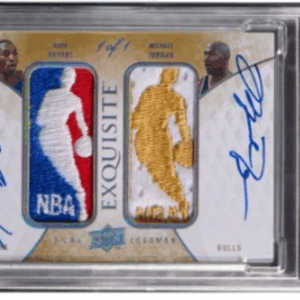The world of trading cards isn’t just flush with vibrant designs, player stats, and collector nostalgia—it’s also ripe with legal battles that resemble high-stakes showdowns worthy of their own sports drama. Welcome to the latest episode in the saga between two colossi of the trading card industry: Panini and Fanatics. Think of these legal titans as they take their corners in a courtroom where the stakes are as high as a vintage Michael Jordan rookie card.
For those needing a refresh, Panini and Fanatics have been embroiled in a clash fit for the history books, filled with as many controversies as there are All-Star game nights. The fuse was lit when Fanatics scored exclusive licenses with the NFL and NBA for trading cards—a move that sent shockwaves through the industry and pushed Panini into the role of the aggrieved underdog, subsequently filing an antitrust lawsuit against Fanatics in 2023. Panini argued that Fanatics has an iron grip on the market, monopolizing the glittery world of player cardboard collectibles as they controlled the narratives, and, more importantly, the prices.
Fanatics, not one to back down from a legal challenge, matched Panini’s move with a countersuit. Their story? Panini was meddling with their business dealings, sabotaging their grand plans, and unfairly thwarting their muscle-flexing ambitions. The plot thickened as both parties braced themselves for what would become a courtroom saga that any epic sports feature could envy.
Enter Judge Laura Swain of the Southern District of New York, stepping into the ring this past Monday with a ruling fit to entertain any spectator of legal clashes. In an unexpected twist that could rival the surprise endings of a last-minute touchdown, the judge declared that both lawsuits can proceed, though not without a few snips and trims to the cases each side presented.
Panini’s antitrust claims remain intact—at least in part. Judge Swain wasn’t ready to sweep Panini’s allegations under the courtroom rug. She acknowledged that Panini possibly presented enough evidence to argue Fanatics’ monopoly power might be overbearing—a domineering show that allows them to set the rules of the game and oust competitors. The judge allowed these claims to stick around in the legal arena, like glitter clinging to a card’s edges.
But not everything went in favor of Panini. Their damage claims were tossed out, much like a failed trade. Judge Swain pointed out that Panini, as one of the last heavyweights in the business, wasn’t exactly left out in the rain by the current market setup. It seemed they, too, enjoyed some benefits from the industry’s framework, much like a secondary player capitalizing on a teammate’s pass.
Meanwhile, Fanatics found their unfair competition claims thrown out, leaving them without a vital piece of their legal armory. The judge remarked that Panini’s actions weren’t transgressions but rather dramatic desk thumping that disrupted Fanatics’ plans—within the bounds of the law’s cold embrace.
However, Fanatics did manage to keep one dagger sharp—their employee poaching allegations. The court sided with Fanatics in claiming Panini had waved legal threats like a general issuing final commands on the battlefield as they sought to block their ranks from defecting to Fanatics. This claim retained within the ongoing litigation keeps Fanatics’ spirits buoyant.
As these courtroom quarterback matches continue, the upcoming phases—like the critical half-time of a sports event—are set to delve deeper with discovery forging ahead. Companies will summon sworn testimonies, present internal documents, and field witnesses like eager players ready for a call-up. Fans and collectors will watch with bated breath as months or potentially years drawn in the timeline of this legal contest.
For trading card enthusiasts, the romance of collecting remains largely unscathed. Topps—now under Fanatics’ expansive wing—continues to churn out NBA and NFL cards, piquing collectors’ interest as an ever-steady supply of new pack surprises. But consequences hang in the balance like a pending referee’s ruling. Perhaps Panini’s victory could usher in smaller players to strut into the market, diversifying choices like a genre-bending soundtrack.
Alternatively, if Fanatics proves Panini’s meddling, they might deliver a financial kneecap to Panini, reshaping the market hierarchy. Choices might widen, or Fanatics might weave a tighter dominion over the collecting landscape, forcing collectors to wonder about their purchase paths.
Here we stand, watching the marketplace’s titans, their legal swords locked in a dance reminiscent of an ancient duel. Enthusiasts and investors become observers, each awaiting their moment to define the trading card hobby world’s future landscapes. With both sides in firm positions and aficionados engrossed in the unfolding drama, this courtroom battle remains a hotbed of intrigue that could rewrite the rules for future collector generations.






